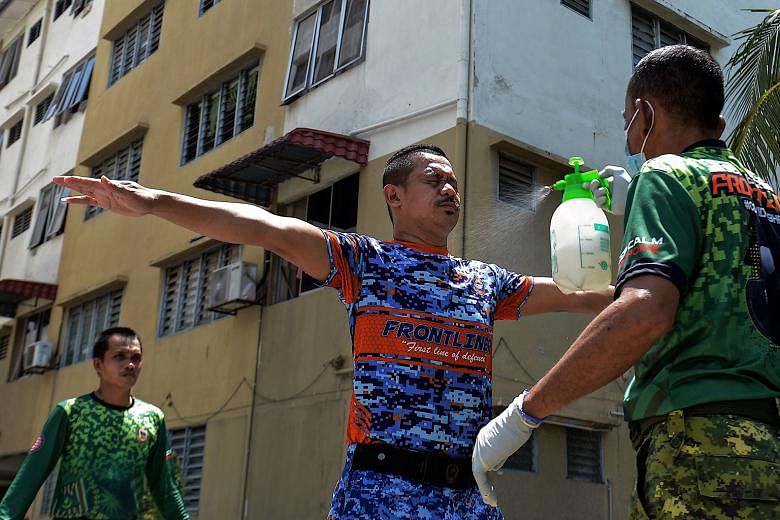With Malaysia's Covid-19 situation worsening and a record daily increase of 871 cases on Sunday, people are questioning government flip-flops over restrictions in the Klang Valley even as Prime Minister Muhyiddin Yassin's government is at risk of collapse.
Just days after announcing that tighter controls would begin on Oct 14, the government, among other things, allowed mosques, gyms and parks to reopen.
"There are quarters who called for stricter control, but there are also those who think otherwise," said Senior Minister for Security Ismail Sabri Yaakob. "Nevertheless, we must create a balance between reviving the economy and protecting the people from the virus."
Yesterday, he announced yet another new rule: Klang Valley residents must work from home starting tomorrow.
Malaysia is experiencing its worst wave of the coronavirus.
Sabah's Covid-19 situation is increasingly dire, prompting the federal government to fly front-line workers into the state and send in the military to set up field hospitals.
Sarawak may be the next Covid-19 battleground as some politicians are pushing for state polls soon even though they are not due until mid-next year.
Kuala Lumpur resident Susan Lim, 50, said: "The U-turns make it seem like the government is bowing to populist demand. Our positive cases are higher and more widespread than during the earlier lockdown in March, but the measures are more relaxed."
The conditional movement control order in Kuala Lumpur, Selangor and Putrajaya is expected to end next Tuesday, but health experts have said it may be extended if the outbreak does not improve.
Tan Sri Muhyiddin was previously seen as having managed the outbreak well but this is fast changing, with politicians seemingly distracted by ongoing power grabs and the constant U-turns.
Political analyst Awang Azman Awang Pawi of Universiti Malaya said: "Muhyiddin's position is increasingly shaky... as many Malaysians are unhappy over how the current outbreak is handled.
"The government needs to be firmer in handling the outbreak. Flip-flops will just create confusion among the people, and the government will be seen as lacking a clear policy in the fight against Covid-19.
"This will lead to a further lack of confidence in the Perikatan Nasional administration and Muhyiddin's premiership."
There are also concerns that a snap general election, if called, would cause cases to spike further.
For now, the authorities have ruled out a return of the stricter movement control order (MCO) in Klang Valley. The MCO saw all non-essential businesses and schools shut between March 18 and May 4.
"An MCO probably will work in a shorter period of time but will cost the country economically," Health Ministry director-general Noor Hisham Abdullah said yesterday.
He noted that the national reproduction number (Rt) fell in the last week to 1.5 from 2.2. The aim is to achieve an Rt of 0.3. Rt refers to the infection rate and is an estimation of the average number of people one patient can infect.
Selangor's Rt dropped from 1.98 to 1.48 in the last week.
But some, like Madam Lim, believe tighter curbs are needed.
"We can't afford more disruptions to the economy but surely a short but strict lockdown is better than a prolonged one that allows so much movement," she said.

